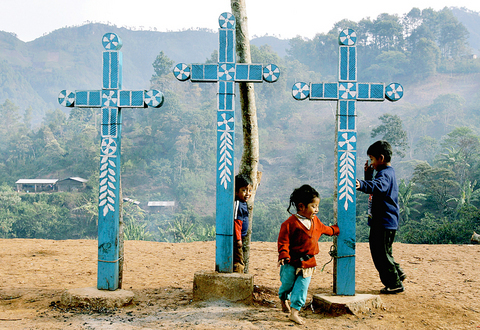Mexico's Zapatista rebels were emerging from their jungle hideout yesterday to launch a nationwide campaign tour billed as a pacifist alternative to this year's already contentious presidential race.
The beginning of the six-month tour was timed to coincide with the anniversary of a brief Zapatista uprising in the name of Indian rights, on New Year's Day 12 years ago. This time, however, the Zapatistas say they will not wield Kalashnikov rifles or declare war.
Instead, the ski mask-wearing, pipe-smoking Zapatista leader Subcomandante Marcos -- who is adopting a more civilian-sounding title, "Delegate Zero" -- has promised to build a nationalist leftist movement that will "shake this country up from below" during a visit to Mexico's 31 states.

PHOTO: AP
Marcos has also said the Zapatistas won't run for elected office or join Mexico's mainstream political process, which he describes as corrupt and out of touch with the people -- leaving some in Mexico confused about the rebels' intentions.
"What kind of movement is it going to be? That is the million-dollar question," said Miguel Alvarez, head of Serapaz, a pacifist group that helped with negotiations between the government and the Zapatistas. "I guess we'll just have to wait and see."
When the Zapatistas first stormed San Cristobal de las Casas on New Year's Day in 1994, they called for equal rights for Mexico's Indian minority and an end to one-party rule by the Institutional Revolutionary Party (PRI), which governed Mexico without interruption for most of the 20th century.
After the PRI's defeat in 2000 at the hands of current President Vicente Fox of the National Action Party, the rebels focused on building a network of Zapatista-run schools and medical clinics in dozens of Indian villages they control in Mexico's southernmost state of Chiapas.
The Zapatistas say this year's tour is a third phase of their revolution.
"A step forward in the struggle is only possible if we unite with other sections of society," the Zapatistas' command council said in a recent statement.

A fire caused by a burst gas pipe yesterday spread to several homes and sent a fireball soaring into the sky outside Malaysia’s largest city, injuring more than 100 people. The towering inferno near a gas station in Putra Heights outside Kuala Lumpur was visible for kilometers and lasted for several hours. It happened during a public holiday as Muslims, who are the majority in Malaysia, celebrate the second day of Eid al-Fitr. National oil company Petronas said the fire started at one of its gas pipelines at 8:10am and the affected pipeline was later isolated. Disaster management officials said shutting the

US Vice President J.D. Vance on Friday accused Denmark of not having done enough to protect Greenland, when he visited the strategically placed and resource-rich Danish territory coveted by US President Donald Trump. Vance made his comment during a trip to the Pituffik Space Base in northwestern Greenland, a visit viewed by Copenhagen and Nuuk as a provocation. “Our message to Denmark is very simple: You have not done a good job by the people of Greenland,” Vance told a news conference. “You have under-invested in the people of Greenland, and you have under-invested in the security architecture of this

UNREST: The authorities in Turkey arrested 13 Turkish journalists in five days, deported a BBC correspondent and on Thursday arrested a reporter from Sweden Waving flags and chanting slogans, many hundreds of thousands of anti-government demonstrators on Saturday rallied in Istanbul, Turkey, in defence of democracy after the arrest of Istanbul Mayor Ekrem Imamoglu which sparked Turkey’s worst street unrest in more than a decade. Under a cloudless blue sky, vast crowds gathered in Maltepe on the Asian side of Turkey’s biggest city on the eve of the Eid al-Fitr celebration which started yesterday, marking the end of Ramadan. Ozgur Ozel, chairman of the main opposition Republican People’s Party (CHP), which organized the rally, said there were 2.2 million people in the crowd, but

JOINT EFFORTS: The three countries have been strengthening an alliance and pressing efforts to bolster deterrence against Beijing’s assertiveness in the South China Sea The US, Japan and the Philippines on Friday staged joint naval drills to boost crisis readiness off a disputed South China Sea shoal as a Chinese military ship kept watch from a distance. The Chinese frigate attempted to get closer to the waters, where the warships and aircraft from the three allied countries were undertaking maneuvers off the Scarborough Shoal — also known as Huangyan Island (黃岩島) and claimed by Taiwan and China — in an unsettling moment but it was warned by a Philippine frigate by radio and kept away. “There was a time when they attempted to maneuver